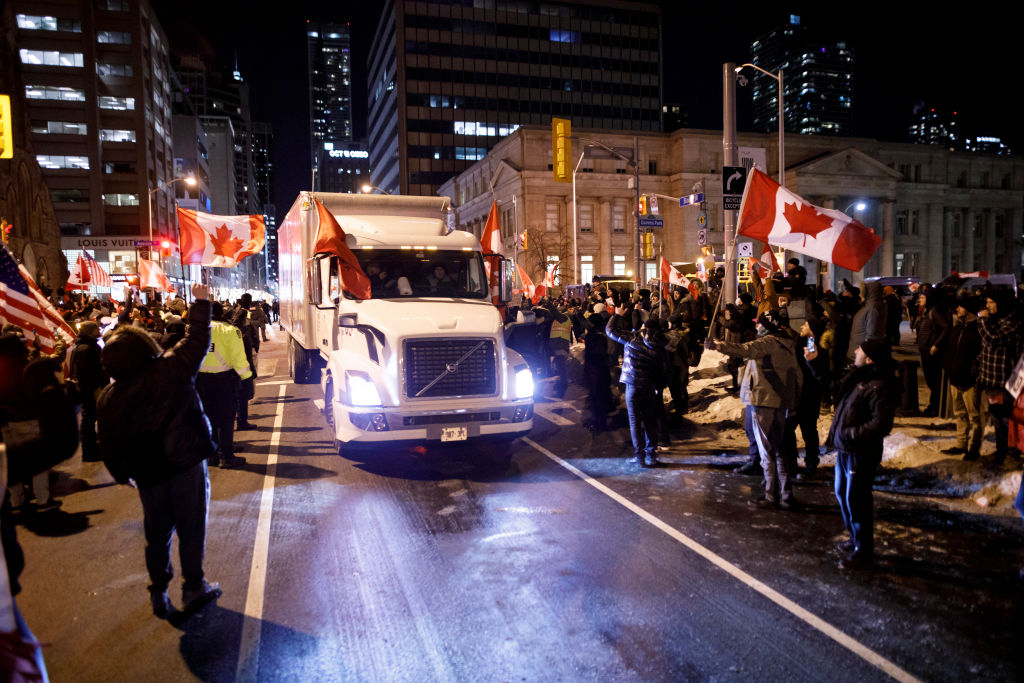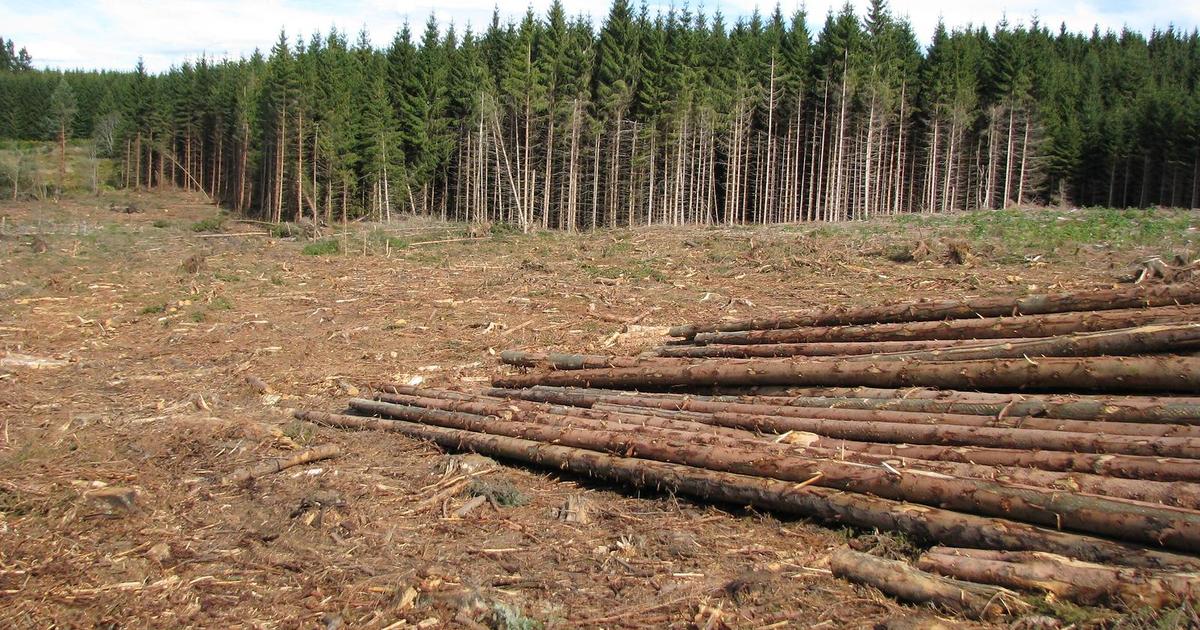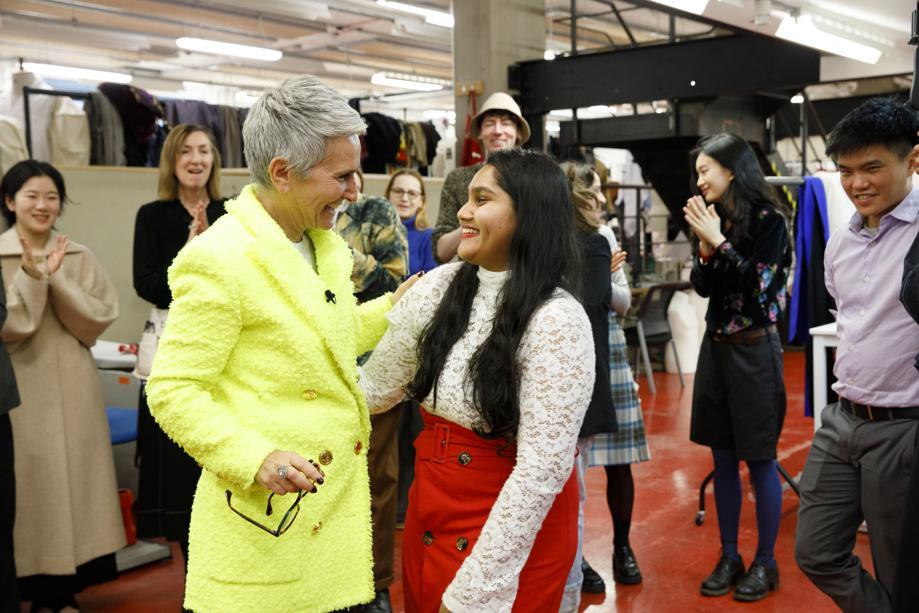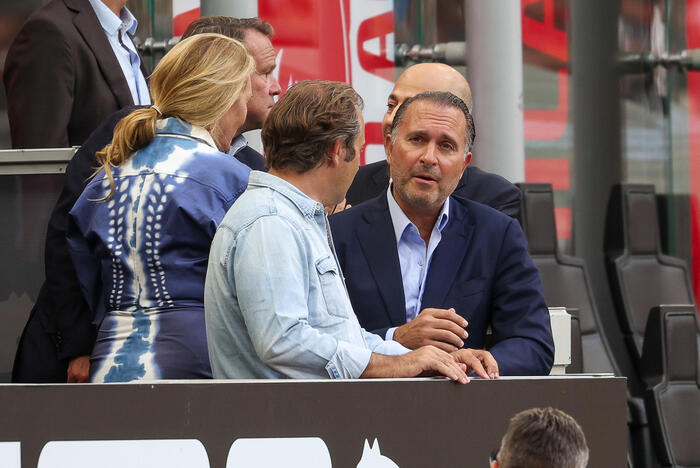Truckers block border with Canada 3:19
(CNN) --
For two weeks now, Freedom Convoy protesters leading protests across Canada have succeeded in frustrating both political leaders and law enforcement with their uncompromising protests against COVID-19 restrictions. .
Police forces across the country have expressed a reluctance to act quickly, saying they prefer to avoid confrontation.
The 'Freedom Convoy' began as a protest by truckers fighting vaccine mandates in both Canada and the United States, but during the journey across the country the convoy attracted the support of many Canadians who say they are fed up with all the health restrictions due to covid-19.
By the time the convoy reached Ottawa, hundreds of drivers and their trucks joined thousands of other protesters in cars and on foot to demand changes to the way the government was handling Covid-19.
And the protesters' demands have intensified, not only insisting that vaccination mandates be lifted for everyone, but also calling for all businesses to open, including restaurants and gyms, removing capacity limits at large events, and removing the mask mandates, especially in schools.
As the protests have dragged on, officials at all levels of government say they now pose a threat to public safety and the economy.
Many leaders have demanded an end to the protests, but few of those words have been met with concrete action.
advertising
Protests in Canada: truckers reject measures against covid-19 and block the international bridge that connects with the US
These are the effects in the US of the truckers' strike in Canada 2:17
These are some political and legal scenarios that could play out in the protests in Canada.
Giving Peace a Chance: Convincing Protesters to Leave Voluntarily
This is the preferred option by law enforcement officials who say they recognize the right of Canadians to protest.
Police in Windsor, Ottawa and Alberta have stated that they have tried to keep the lines of communication open for protest organizers and individual activists, trying to convince them to leave voluntarily.
This has had limited success, with protesters bolstered with messages of support online and material support on the ground with money and supplies.
On Thursday, Ottawa police reported that nearly two dozen trucks had been voluntarily removed from two different protest sites.
But hundreds remain, still blocking the city's streets.
And negotiations on border protests have had very limited success, especially in Alberta, where communication efforts appear to have hardened the protesters' position.
CNN has spoken to some truckers who say they might consider leaving if Prime Minister Justin Trudeau spoke directly to them about his concerns.
"These gentlemen, these guys in that building and they can just come out and show some respect and at least talk to us," said a driver who identified himself as Doran, parked outside Canada's parliament.
Even Ottawa Police Chief Peter Sloly indicated in the early days of the protests that he did not believe the police were best suited to resolve the situation and that a political solution might be the only effective way to end the protests. .
That governments across the country give in to the demands of the protesters
This is perhaps the least likely scenario of all.
Police and political leaders say it would set a dangerous precedent to give in to "angry mobs," in the prime minister's words.
Several provinces, including Saskatchewan, Alberta and Ontario, have announced in recent days that they will lift some restrictions following the protests in Canada.
Saskatchewan is making the most drastic and fastest changes, doing away with its vaccine passport system, scrapping mask mandates and reporting Covid-19 cases weekly instead of daily.
Alberta is also removing its mask mandate for children and eliminating its vaccine passport program.
Ontario recently opened restaurants and has restored most sports activities for children and adults.
These decisions, however, are not related to the protests given that those governments have consistently said that their goal is to lift covid-19 restrictions as soon as cases and hospitalizations decrease.
Protesters in Ottawa also told CNN they won't be affected by a phased approach to lifting restrictions.
They are demanding a nationwide rollback of all covid-19 health measures.
That the authorities remove trucks and cars from the protest sites
Ottawa officials have been looking at options to remove vehicles for days, but have towed very few cars, let alone trucks.
They say their efforts are being thwarted by tow truck drivers and companies who fear damage to their businesses or, worse, a violent confrontation.
Ottawa police say they are actively investigating reports that tow truck operators have been threatened and intimidated.
Police say it has some towing capacity, but not enough to move a substantial number of trucks from protest sites without the help of private towing companies.
Ottawa police say they have issued more than 1,700 tickets, and in some cases, fines for city violations have doubled or tripled.
City and provincial insurance and licensing officials also say they are looking to step up enforcement of parking, insurance and licensing violations, but this too could take weeks to take effect.
Protests in Canada over restrictions against covid-19 reach their second week, while they investigate alleged cases of hate
A convoy of truckers and supporters has occupied downtown Ottawa since February 5 in protest of Canada's Covid-19 vaccine mandate, with the convoys branching out to other major cities such as Toronto this weekend. (Photo by Cole Burston/Getty Images)
That the Canadian authorities expel those who protest by force
Law enforcement and politicians have been trying to avoid this scenario, fearing that both protesters and police officers could be injured.
Not only does this risk further escalating tensions and potentially inciting more angry protesters to take to the streets in other parts of the country, but it would also require far more police than are currently available.
Ottawa Mayor Jim Watson sent a letter to Premier Trudeau and Premier of Ontario requesting reinforcements of 1,800 officers, including administrative staff.
In a letter provided to the media, Watson wrote: "We must do everything in our power to take back the streets of Ottawa."
The Trudeau government says it is continuing to send more Royal Canadian Mounted Police officers to various protest sites, but Ottawa's request for 1,800 additional officers is unlikely to materialize anytime soon, if at all.
Ottawa police say they have made 25 arrests to date.
However, arresting and forcibly removing protesters may be an option that police consider.
"There will be accountability for any illegal criminal activity that occurs in this city in connection with this demonstration," Ottawa Police Chief Sloly said during a news conference on Thursday.
However, political leaders are aware of the risks of this strategy.
“I know a lot of people just say the police come in and get everyone out and restore law and order.
And that's what we all want to see happen," Windsor Mayor Drew Dilkens told CNN in an interview Wednesday.
"The problem is that there are a number of people who are looking for confrontation. There are people who have expressed themselves in the media saying that they believe this is a cause they are willing to die for."
Use the army to restore order
Not only is this the least preferred option, it is highly unlikely.
Last week, after Sloly suggested the military might need to settle the protests, he was met with stiff resistance from the federal government.
Through a spokesperson, Defense Minister Anita Anand told CNN that Canada's armed forces are not a police force and are "not involved in law enforcement in this situation."
Trudeau elaborated last week, saying: "You have to be very, very cautious about deploying military forces in situations involving Canadians. It's not something anyone should go into lightly."
Under the Defense of Canada Act, a province may request that, "where a riot or riot occurs or is considered likely to occur," the province's attorney general may request that the services of the armed forces "They are called to the help service of the civil power".
However, the province must request it, and the federal government determines whether to grant the request.
Covid-19


/cloudfront-eu-central-1.images.arcpublishing.com/prisa/Y3OO7L2MGUGR5X2A7MOEHZAMEM.jpg)




/cloudfront-eu-central-1.images.arcpublishing.com/prisa/CXNNVU7NQJGRBKM7CSDDCQS3UA.JPG)

